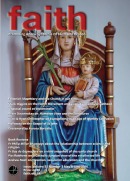Book Review: Clarity about God and Science
Article:
01.05.18
The Believing Scientist — Essays on Science and Religion
by Stephen M. Barr, William B. Eerdmans, 226pp, £17.99.
reviewed by Philip Miller
Let me state at the outset that this is an excellent book, a straightforward and pleasant read, with 26 short chapters of essays, articles, lectures, and book reviews that Barr has written over the past decade or so. Almost all of the pieces are post-2000, and one third of them from 2010 or later. It is, therefore, an up-to-date analysis of many of the crucial questions of faith and science, written by an active researcher in the field of particle physics at the University of Delaware. Barr has a clarity of expression, with a gift for the use of very illuminating images in his writing, which makes reading this work a pleasure.
Undoing the confusion
Barr reminds us from the outset that the controversy is not that of science vs. religion, but of materialism vs. religion. Materialism is a philosophical attitude that sees no place for the divine or the spiritual, and asserts that matter is all that there is. Science is not the same as this materialistic philosophy, though many in the debate often confuse the two. Barr’s book is fundamentally about gently undoing this confusion, and allowing the beauty of science in harmony with belief in God to show its face. A masterly opening chapter sets the scene, with a clear analysis of how the materialist myth has deliberately ‘retold’ the story of science, and created the sense of faith–science opposition that we all recognise as prevalent today.
In a powerful passage, Barr sums up the implications of much of modern scientific discoveries about the nature of the universe and of man, viz., that they bring us back to affirm the biblical notion of creation and man’s place in it. “After all the twists and turns of scientific history we look around and find ourselves in very familiar surroundings. We find ourselves in a universe that seems to have had a beginning. We find it governed by laws that have a grandeur and sublimity that bespeak design. We find many indications in those laws that we were built in from the beginning. We find that physical determinism is wrong. And we find that the deepest discoveries of modern physics and mathematics give hints, if not proof, that the mind of man has something about it that lies beyond the power of either physics or mathematics to describe. … The search for truth always leads us, in the end, back to God” (conclusion of Ch. 1).
‘Random’ but not uncaused
Crucial issues that Barr treats in his sections on evolutionary theory are, for example, ‘randomness’ (Chs. 5 & 6) and so-called ‘intelligent design’ (Chs. 7 & 8), as well as giving Richard Dawkins a ‘run for his money’ as he unpicks the latter’s polemical work, ‘A Devil’s Chaplain’ (Ch. 3). The correct explanation of scientific ‘randomness’ with regard to the progress of biological evolution is indeed most pertinent, since it is the crux of the matter: those who wish to deny God’s overarching plan of cosmic design will constantly argue that the ‘random’ nature of genetic mutations means that evolution cannot therefore be ‘guided.’ Barr explains: “some biologists, when they explain evolution to the public or to hapless students, do argue from the ‘randomness’ of genetic mutations to the philosophical conclusion that the history of life is ‘unguided’ and ‘unplanned.’ … So, if the word ‘random’ necessarily entails the idea that some events are ‘unguided’ in the sense of falling ‘outside of the bounds of divine providence,’ we should have to condemn as incompatible with Christian faith a great deal of modern physics, chemistry, geology, and astronomy, as well as biology. This is absurd, of course. The word ‘random’ as used in science does not mean uncaused, unplanned, or inexplicable; it means uncorrelated” (ch. 5). Barr goes on to use a variety of illuminating examples to explain clearly what statistical randomness actually is, and is not, and to show its compatibility with divine providence.
Human consciousness
Another fascinating and topical area that Barr considers is the whole question of the mind and free will: in chs. 9–15 he introduces various anti-materialist arguments that human consciousness is not reducible to physics. The human brain itself is the most complex entity in material creation, containing of the order of 1011 neurons in a typical brain, each capable of signalling to maybe 104 others, and so, as Barr quotes, “The complexity of connections between neurons is … gargantuan. … The combinatorial possibilities are immense” (Ch. 15). Making progress in the area of neuroscience is therefore fraught with difficulties, but Barr shows that this is not in itself the issue. Our freedom of will, our ability to conceptualize, and our role as observer (one who knows the outcomes) within the quantum-mechanical framework, all point to the independence of the human mind from a deterministic response. Barr quotes a leading physicist, whose opinion he shares: “The premise that you can describe in terms of physics the whole function of a human being … including its knowledge, and its consciousness, is untenable” (Ch. 11).
To conclude, I quote a summary sentence in which Barr looks at the grand whole: “The idea that all the various aspects and components of the natural order fit together in some internally coherent way and the idea that some mind conceived of the natural order can be seen themselves to fit together in a coherent way” (Ch. 13). It is refreshing to see the clarity of vision of a scientific author who sees the universal coherence of mind and matter, of God and his Creation, and how science is born of this very rational understanding.
Notes:
Fr Philip Miller is a parish priest in the diocese of Westminster and holds a PhD in observational radio-astronomy.





